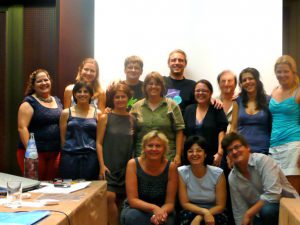The DIGITAS (Digital Asylum-Seekers – Media education crash course for parents and grandparents) project arose from the need for a media education-related training action focused on trainers and teachers working with parents and older learners. DIGITAS produces a training course to be available in the Comenius-Grundtvig Training Database and be delivered to adult education trainers and teachers. With this questionnaire, we intend to obtain a clear picture of the needs of the ICT trainers working with parents and grandparents to organize the training course.
Sem Abrigo Digitais – Curso de formação médio para pais e avós
(142293 – LLP – 1 – 2008 – 1 – RO – GRUNDTVIG – GMP)

Objectives of the project:
- contribute to the widening of access to fundamental basic skills such as literacy as needed in a contemporary media-saturated
- environment, as well as basic digital competence, and equipping older adults with skills needed to cope with change;
- support this approach by collating good practice on inter-generational and family learning; and
- train teachers and trainers working with adults, and also with online support – through a course developed by the partnersh.
The central output the project aims to produce is a course to be fed into the Comenius-Grundtvig Training Database and be delivered to teachers and trainers seeking LLP/Grundtvig grants for in-service training for staff. The concept underlying such a course would be that Marc Prensky’s terms of digital natives and digital immigrants inform rather accurately the distinction and the divide induced by the new cultural forms generated by new technologies. While the reality described by Papert, Gee, Tapscott or Prensky himself is ‘both more prosaic and more complex’ (Buckingham), the new textual landscapes require increasingly multimodal literacies. Such a course will therefore seek to (1) identify and explore patterns of convergence between ‘old’ and ‘new’ media, and inherent continuities that mostly fill the assumed gap between them; (2) explain to digital asylum-seekers major characteristics and features of multimodal literacies; and (3) emphasizing and practicing some learning principles embedded in the electronic, online and wireless texts that make up contemporary textual landscapes (such as computer/video games and online communities, for example).
The consortium proposes a set of 8 workpackages, as follows:
- An ‘overall management’ package and a distinct management package involving ‘monitoring and process evaluation’ led by two different partners;
- Development of outputs is organized in three different packages – one focused on a preparatory phase, involving preliminary research and the operation of a needs assessment, prior to structuring the course; another one centred around the website and the e-learning platform supporting the ‘offline’ course; and the central development workpackage dealing with the design of the course itself and support materials (handbook for trainers, handbook for learners);
- A ‘dissemination’ package, operational from month 3 and extending beyond the end of the contractual period;
- An ‘exploitation’ package, running from month 17 and extending beyond the end of the contractual period;
- A ‘quality assurance’ workpackage designed to include both the piloting of the training course and the output evaluation that will focus On the initial content and the constant incorporation of feed-back resulted from piloting and delivery;
Consortium partners involved:
- P1 RO Epsilon III Overall organisation of piloting course content and output evaluation ;
- P2 RO UB-FG Piloting course content, support and feed-back for output evaluation ;
- P3 LT IMOTEC Piloting course content, support and feed-back for output evaluation ;
- P4 ES ONAGEB.SPAIN Support and feed-back for output evaluation ;
- P5 IT Europole Co-moderating WP, piloting course content, support and feedback for output evaluation ;
- P6 BE Vesalius College Support and feed-back for output evaluation ;
- P7 TR ILEF Piloting course content, support and feed-back for output evaluation ;
- P8 PT ESE Porto Piloting course content, support and feed-back for output evaluation .
2009_DIGITAS_Zaragoza
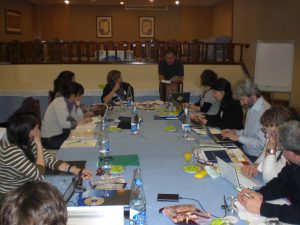
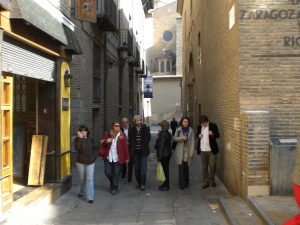
2009_Digitas_03_Porto_Jun
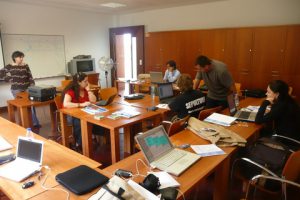
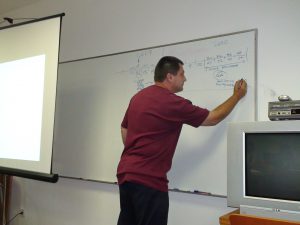
2009_Digitas_04_Verona_Set
2010_Digitas_05_Vilnius_Dez

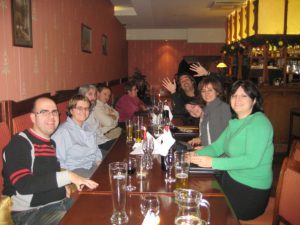
2010_Digitas_06_Ankara (ONLINE)
2010_Digitas_07_Romenia
2010_Digitas_08_Palermo
